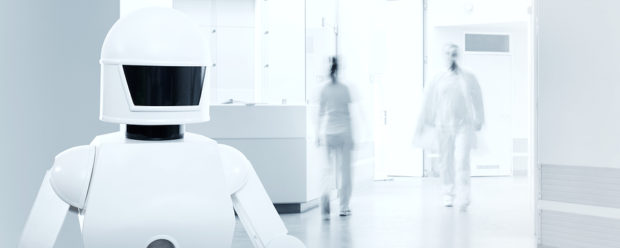A shortage of workers and restrictions on human contact because of the coronavirus pandemic is driving up demand for service robots in China, potentially boosting a sector that has struggled to scale up commercially.
Venture capitalists with expertise in the robotics sector said they are anticipating orders from China to rise significantly this year, based on interest since the end of January when the virus began spreading in China.
That could take the use of service robots from novelties that deliver food and drink in restaurants and hotels to an army that performs essential functions in hospitals bound by strict no-contact rules.
“The healthcare segment has been really hot,” said Emil Jensen, vice president of China sales for Denmark-based Mobile Industrial Robots, which makes customizable robots that are used both in hospitals and on factory floors.
“We are seeing a many, many-fold increase in new demand from hospitals, and a lot of people are calling us for the first time,” Jensen said.
Among those in demand are disinfectant robots, which cast UV lights across a room to kill germs.
“Compared to the robots you see in manufacturing plants, these seemed like gimmicks with nothing unique about them,” Gong Peng, deputy dean at Shenzhen University General Hospital, said.
However, once the virus hit, various companies donated disinfectant and food delivery robots to the hospital, proving their usefulness both in preventing virus transmission and managing supplies.
Before the robots were introduced, “every time a nurse wanted to deliver food to a patient, he or she had to wear a protective suit that would take ten minutes to put on,” said Gong. “That was when protective gear supplies were really tight, so the robots helped us a lot.”
Shanghai-based Keenon Robotics, which has long sold robots that deliver food to customers at restaurants like hotpot chain Haidilao, said it is accelerating plans to start selling medical robots.
“We had been planning this for the past year, but the virus has caused us to speed things up,” said Chief Executive Li Tong in an interview.
Beijing-based Yunji Robotics, which makes delivery robots, and Shanghai-based TMIRob, which makes disinfectant robots, have increased distribution in the wake of the virus, according to investor Yu Chen, the managing director of venture capital firm Yunqi Capital.
Outside China, Denmark-based UVD Robotics, which also makes UV disinfectant robots, announced a distribution deal with a Chinese medical device supplier that would help bring its robots to hospitals across China.
Yu, who estimates that Chinese companies have sold about 15,000 service robots since 2018, said he expects orders for delivery and disinfectant robots to increase threefold this year.
Factory Automation
Along with the service robots, the coronavirus pandemic could spur demand for more automation at factories.
Many Chinese semiconductor plants located in the virus epicenter of Wuhan have run continuously throughout the outbreak, which chip industry experts attribute to their highly automated production processes.
Still, the virus itself also presents an obstacle to widespread long-term adoption of automation because of the economic stress it is imposing on many companies.
Huan Liu of Mujin, which makes intelligent robot sorting and picking systems, said companies often must spend millions of dollars for a basic automation project, which can take six to twelve months to complete.
“For new customers, it depends on which factor is stronger,” said Liu. “The need to replace labor during the virus, or the need to balance the budget as sales go down during the virus.”
($1 = 7.0703 Chinese yuan renminbi)
(Reporting by Josh Horwitz in Shanghai, additional reporting by Jane Lee in San Francisco and the Shanghai Newsroom; editing by Jane Wardell)





















 Flood Risk Misconceptions Drive Underinsurance: Chubb
Flood Risk Misconceptions Drive Underinsurance: Chubb  What Analysts Are Saying About the 2026 P/C Insurance Market
What Analysts Are Saying About the 2026 P/C Insurance Market  Lessons From 25 Years Leading Accident & Health at Crum & Forster
Lessons From 25 Years Leading Accident & Health at Crum & Forster  Berkshire-owned Utility Urges Oregon Appeals Court to Limit Wildfire Damages
Berkshire-owned Utility Urges Oregon Appeals Court to Limit Wildfire Damages 







